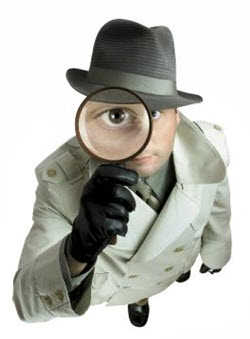Private investigators in the UK

Private investigators (also known as private detectives, inquiry agents and private eyes) can be hired by individuals or groups to carry out investigations.
Private investigators come from all walks of life, but some backgrounds are more heavily represented within the field than others. To mention a few examples, it is quite common for private investigators to have a background in the military or law enforcement, or from the fields of private security, including jobs such as bodyguard and security guard. Some types of investigations require specific skills; a private investigator tasked to find evidence of embezzlement might for instance need skills pertaining to forensic accounting.

Warning: A number of UK investors have contacted us asking for help after having been scammed by binary options brokers operating out of Israel. It can be very hard to help an investor after he has been scammed. It is a lot easier to prevent being scammed in the first place. We therefore like to implore all potential investors to make sure they register with an honest broker before they deposit any money to the broker. Click to find an honest broker.
Here are a few examples of fields within which many private investigators work:
- Accident investigation
- Aiding clients subjected to extortion and/or blackmail
- Aiding the defence in criminal court cases
- Alimony disputes
- Child custody disputes
- Child support disputes
- Computer forensics
- Counter-measures against industrial espionage
- Corporate loss prevention
- Divorce cases
- Due Diligence
- Employee screening
- Forensic accounting
- Fraud investigation
- Insolvency investigation
- Insurance claim investigation
- Internal investigations of employee misconduct, e.g. internal policy violations or illegal activities such as sexual harassment
- Intellectual property disputes
- Investigating suspected abuse of workman’s compensation
- Litigation
- Locating the genetic parents of adopted individuals
- Marital property disputes
- Missing or wanted persons
- Missing pets and other animals
- Missing objects
- Paternity cases
- Process serving (the personal delivery of summons, subpoenas and other legal documents)
- Surveillance
- Suspected infidelity
- Technical surveillance counter-measures
- Theft investigation
- Tracing of absconding debtors and/or their assets
Some private investigators act as professional witnesses. They observe situations (and often also document them using cameras, sound recorders, etc) and report the actions or lack of actions to a court.
Licensing
In many parts of the world, private investigators must be licensed.
Please keep in mind that the rules for when someone is considered a private investigator (and thus must be licensed) can very significantly from one jurisdiction to another. The requirements for obtaining a license also varies.
In most jurisdictions, being licensed doesn’t give the private investigator any special authority when comes to issues such as the right to carry firearms or detaining people. Instead, the private investigator has the same rights as any other individual in that specific jurisdiction, e.g. the right to do a “citizen’s arrest”, the right to apply for a gun permit, and so on.
Licensing in the UK
 At the time of writing, there is no law requiring private investigators in the UK to be licensed by any governmental or government-backed authority.
At the time of writing, there is no law requiring private investigators in the UK to be licensed by any governmental or government-backed authority.
Since 2001, the Security Industry Authority (SIA) has been the regulatory body for private investigators in the UK. Plans to require licensing was in the works for a few years, but these plans have yet to come into fruition.
Back in the early 2000s, SIA announced that private investigators in the UK would need to be licensed at some point in the future, and that there was a scheduled date for the issue to be discussed in parliament (May 2005). At this time, the passing of new legislation seemed to be imminent, but priorities changed and the issue of licensing was placed on the back-burner.
You can read more the current situation this in our article “Private Investigator regulation in the UK”.
Market expansion for PI:s in the UK
Throughout the 20th century, the market for private investigators in the United Kingdom was comparatively limited, largely due to the existence of a highly efficient and well-funded police force equipped with sufficient resources to successfully investigate a wide range of issues brought to their doorstep by the public.
Today, this situation has changed, partly due to budget cuts and partly due to an increase in complex international crime cases that are difficult to investigate and prosecute and therefore consume large chunks of police resources. The ongoing war on terrorism has also taken its toll on an already strained police budget.
As the police force struggles to keep up with the need to prevent and solve major crimes – especially of the violent kind – there simply isn’t enough resources left to devote to cases that receives a lower priority. In 2011, it was estimated that over £2 billion was lost in the UK insurance sector alone through failure to collect surveillance evidence!
As a result of this changing landscape, corporations, individuals and organisations have become increasingly interested in utilizing the services of private investigators to help prevent and resolve everyday issues. In some cases, the private investigator will gather evidence to be handed over to the police. In other situations, no police involvement is required.
This article was last updated on: March 26, 2022